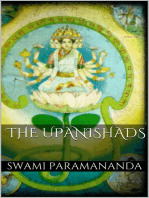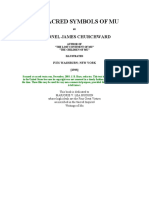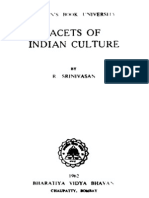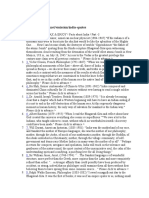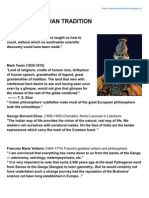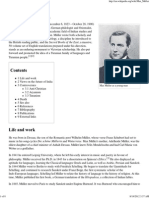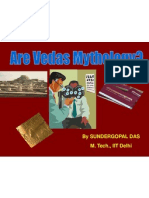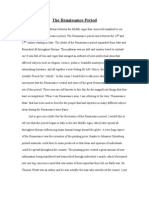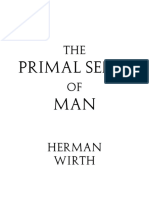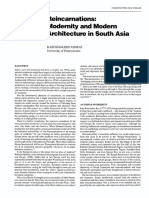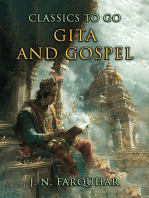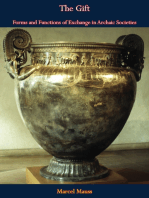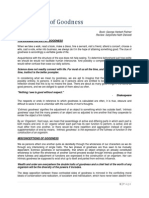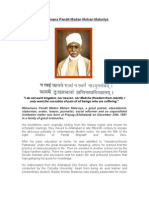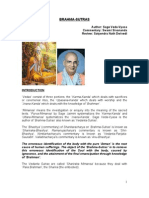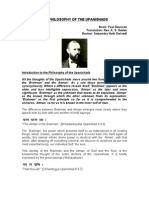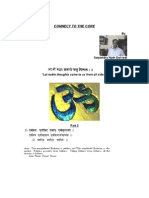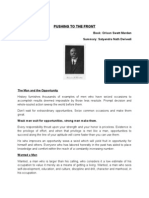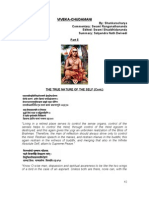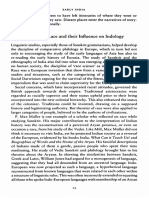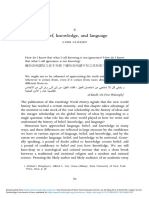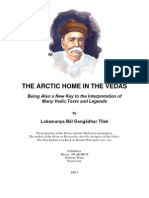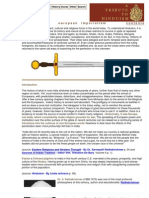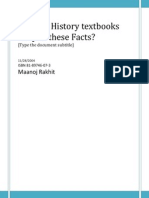0 ratings0% found this document useful (0 votes)
124 viewsI Point To India
I Point To India
Uploaded by
Satyendra Nath DwivediThis document provides an introduction and overview of Max Muller's writings and contributions to understanding Indian philosophy and religion. It discusses how Muller was inspired by his mentor Eugene Burnouf to study Sanskrit and edit the Rig Veda. Muller received funding from the East India Company to publish the Rig Veda with commentary. The document highlights praise that Muller received from scholars like Swami Vivekananda for his deep understanding of Vedic and Upanishadic texts. It also notes that while advocating modern education, Muller felt India's ancient literature and culture should still be studied and encouraged.
Copyright:
© All Rights Reserved
Available Formats
Download as DOCX, PDF, TXT or read online from Scribd
I Point To India
I Point To India
Uploaded by
Satyendra Nath Dwivedi0 ratings0% found this document useful (0 votes)
124 views6 pagesThis document provides an introduction and overview of Max Muller's writings and contributions to understanding Indian philosophy and religion. It discusses how Muller was inspired by his mentor Eugene Burnouf to study Sanskrit and edit the Rig Veda. Muller received funding from the East India Company to publish the Rig Veda with commentary. The document highlights praise that Muller received from scholars like Swami Vivekananda for his deep understanding of Vedic and Upanishadic texts. It also notes that while advocating modern education, Muller felt India's ancient literature and culture should still be studied and encouraged.
Original Title
i Point to India
Copyright
© © All Rights Reserved
Available Formats
DOCX, PDF, TXT or read online from Scribd
Share this document
Did you find this document useful?
Is this content inappropriate?
This document provides an introduction and overview of Max Muller's writings and contributions to understanding Indian philosophy and religion. It discusses how Muller was inspired by his mentor Eugene Burnouf to study Sanskrit and edit the Rig Veda. Muller received funding from the East India Company to publish the Rig Veda with commentary. The document highlights praise that Muller received from scholars like Swami Vivekananda for his deep understanding of Vedic and Upanishadic texts. It also notes that while advocating modern education, Muller felt India's ancient literature and culture should still be studied and encouraged.
Copyright:
© All Rights Reserved
Available Formats
Download as DOCX, PDF, TXT or read online from Scribd
Download as docx, pdf, or txt
0 ratings0% found this document useful (0 votes)
124 views6 pagesI Point To India
I Point To India
Uploaded by
Satyendra Nath DwivediThis document provides an introduction and overview of Max Muller's writings and contributions to understanding Indian philosophy and religion. It discusses how Muller was inspired by his mentor Eugene Burnouf to study Sanskrit and edit the Rig Veda. Muller received funding from the East India Company to publish the Rig Veda with commentary. The document highlights praise that Muller received from scholars like Swami Vivekananda for his deep understanding of Vedic and Upanishadic texts. It also notes that while advocating modern education, Muller felt India's ancient literature and culture should still be studied and encouraged.
Copyright:
© All Rights Reserved
Available Formats
Download as DOCX, PDF, TXT or read online from Scribd
Download as docx, pdf, or txt
You are on page 1of 6
I Point To India
Selected Writings of Max Muller (1823-1900)
Book: Max Muller
Edited: Nanda Mookerjee
Review: Satyendra Nath Dwivedi
Introduction
Unless one is alive to ones own roots, life becomes a void and looses sweetness and light.
India was the cradle of mankind and had the golden age, the traces of which have been
preserved from mankinds infancy till today. The Indian puts his blissfulness in an undisturbed
enjoyment of serenity, he breathes joy, he swims in the sea of sweet dreams and delightful
fragrances.
- J ohann Gottfried Heeder [Ideas on the
Philosophy on the History of Mankind]
After Fredrich Schiegel, the first German to learn Sanskrit, there is a long list of illustrious moments of
German Sanskrit scholars. Foremost among them was Max Muller, who earned the honorary title of a
German Pandit for his first edition of the Rig Veda in Sanskrit.
Max Muller lived and moved in the world of Indian thought for fifty years or more, and watched
the sharp interchange of light and shade in the interminable forest of Sanskrit literature with deep
interest and heartfelt love, till they have all sunk into his very soul and colored his whole being.
- Swami Vivekananda
Attracted by the fame of Professor Eugene Burnouf, eminent not only as a Sanskrit scholar but also as
the first Zend scholar of his day, Max Muller went to Paris to attend Burnoufs lecture at College de
France. It was primarily at Burnoufs suggestion that the young Max Muller set about collecting materials
for editing the Rig Veda, with commentary of Sayana; however, there were two more reasons that
prompted Max Muller to take up this commendable venture. Firstly, he had a desire to know a work which,
to quote Max Muller, has been for so many centuries the foundation on which millions and millions of
human beings have built up their religious convictions. And secondly, to prove that Schopenhauer was
wrong when, in a discussion at Frankfurt, he told Max Muller that the Upanishads were the only important
part the Veda that deserved to be studied, the rest was nothing but priestly rubbish.
Prof. H. H. Wilson, the first Boden Professor of Sanskrit at Oxford, recommended Max Muller to the
East India Company which was fighting against take-over of the Company by the British Crown under the
pressure of public opinion. The Directors of East India Company found, in Max Mullers proposal to edit
Rig Veda, a golden opportunity to prove to the world that they were not bent upon exploiting India and
that they were patrons of learning and culture. They sanctioned the money for the complete edition of Rig
Veda with Sayanas commentary, as proposed by Max Muller. As the Rig Veda was being printed at the
University Press, Max Muller migrated to Oxford in 1848 and spent the rest of his life there.
India has never had full justice done to it, and when I say this I think not only of ancient, but of
modern India also. Though my chief interest lies with ancient India, it should be remembered that
in no other country is the past still so visibly present as in the southernmost home of the ancient
family of Aryans. In India, the religion of the Veda is by no means entirely extinct..The Vedic
Rishis of India have revealed to me a whole world of thought of which no traces exist anywhere
else, and they helped me to throw the first faint rays of light and reason on perhaps the darkest
[almost invisible] period in the history of religion, philosophy and mythology.
- Max Muller
In the whole of world there is no study, except that of the original (Upanishads), so beneficial and
so elevating as that of the Upanishads. It has been the solace of my life, it will be the solace of my
death.
- Schopenhauer
Max Muller is a Vedantist of Vedantists. He has indeed caught the real soul of the comedy of
Vedanta in the midst of all its settings of harmonies and discords the one light that lightens the
sects and creeds of the world, the Vedanta, the one principle of which all religions are only
applications.
- Swami Vivekananda
After meeting Max Muller, Swami Vivekananda said: It was neither the philologist nor the scholar
that I saw, but a soul that is everyday realizing its oneness with the universal; where others lose
themselves in the desert of dry details, ha has struck the well-spring of life. Indeed his heartbeats
have caught the rhythm of the Upanishads know this Atman alone, and leave off all other talk.
If I were to look over the whole world to find out the country most richly endowed with all the
wealth, power and beauty that nature can bestow in some parts a very paradise on earth I
should point to India. If I were asked under what sky the human mind has fully developed some of
its chicest gifts, has most deeply pondered on the greatest problems of life, and has found
solutions of some of them which well deserve the attention of those who have studied Plato and
Kant I should point to India. And if I were to ask myself from what literature we, here in Europe,
we who have been nurtured almost exclusively on thoughts of Greeks and Romans, and of one
Semitic race, the J ewish, may draw that corrective which is most wanted in order to make our
inner life, more perfect, more comprehensive, more universal, in fact more truly human, a life, not
for this life only, but for a transfigured and eternal life again I should point to India.
- Max Muller [India What Can It Teach Us]
Max Muller did advocate modern education for Indian people, but at the same time maintained: India
can never be anglicized, but it can be invigorated. By encouraging a study of their own ancient
literature, as part of their education, a national feeling of pride and self-respect will be reawakened
among those who influence large masses of people. A new National literature may spring up, yet
retaining its native spirit and character. A new national literature will bring with it a new national
life and a moral vigor.
Max Muller did not agree with Macaulays view that English should be the language, the sole language of
future India. He did not agree with some of the Englishmen who declared that Sanskrit was a dead
language. He gave example of The Pandit, published at Banaras, which contained not only editions of
ancient texts, but also treatises on modern subjects, reviews of books published in England, and
controversial articles, all in Sanskrit.
We have before us a stream of literary activity extending over three thousand years. With the
exception of China there is nothing like this in the whole world. It is difficult to give an idea of the
enormous extent and variety of that literature. We are only gradually becoming acquainted with
the untold treasures, which still exist in manuscripts. The number of separate works in Sanskrit,
of which MSS are still in existence, amounts to about ten thousand. This is more, I believe, than
the whole classical literature of Greece and Italy put together.
- Max Muller [Human Interest of Sanskrit Literature]
The true history of the world must always be the history of the few; and as we measure the
Himalayas by the height of Mount Everest, we must take the true measure of India from the poets
of Veda, the sages of the Upanishads, the founders of the Vedanta and Sankhya philosophies,
and the authors of the oldest law books, and not from the millions who are born and die in their
villages, and who have never for a moment been roused out of their drowsy dream of life.
Max Muller made India his spiritual home. The dream of his life to see India face to face remained
unrealized. He rendered an inestimable service to India by showing her greatness to the west.
Great men, depend upon it, do not come down from sky like shooting stars. They come in the
fullness of time, and if we want to understand that fullness of time, we must try to understand that
fullness of time, that is, the time that lay behind and the time that lay before them.
The Science of Language, and, in fact, every true science, is like a hardy Alpine guide that leads us
from the narrow, though it may be more peaceful and charming valleys of our pre-conceived opinions, to
higher points, apparently less attractive, nay often disappointing for a time, till, after hours of patient and
silent climbing, we look around, and see a new world around us. A new horizon has opened, our eyes see
far and wide, and as the world beneath us grows wider and wider, and we embrace the far and distant
and all that before seemed strange and indifferent, with a warmer recognition and a deeper human
sympathy. We form wider concepts, we perceive higher truths.
And yet we have only to ascend again to a higher elevation, as we did before, under the guidance of the
Science of Language, and we shall meet with a new guide, the Science of Religion, which will lead us
to a still higher standpoint, and will open before our eyes a wide panorama, where the past history of the
religions of the world seems almost present again, and where we can see the ancestors of that so-called
heathen, worshipping the same gods and the same God whom our own ancestors worshipped in their
sacred groves more than ten centuries ago.
There was a time when the fathers of the Aryan race, that noble race to which we ourselves
belong, which has since been divided into Greeks and Romans, Celts and Slavs on one side, and
Indians and Persians on the other, invoked with the same names the gods of the sky, and the air,
and the earth, the gods whose real presence was felt in the thunder and the storm and the rain,
whose abode was looked for in the clouds or on the inaccessible crests of the mountains but
chiefly the God, who was seen and yet not seen in the sun, who was revealed every morning in
the brightness of the dawn, and who himself revealed, far away in the golden East, that Infinite
Beyond, for which human language has no name, human thought no form, by which the eye of
faith perceives, and after fashioning it into endless ideal shapes, and endowing it with all that is
most beautiful in poetry, most choice in art, most sublime in philosophy, calls God.
[The Upanishads say:
That from which speech, along with thought, recoils (unable to comprehend), knowing or
experiencing that bliss of Brahman, one never experiences fear from any quarter. [Taittiriya
Upanishad 2.4.1]]
If history is to teach us anything, it must teach us that there is a continuity which binds together
the present and the past, the East and the West. And no branch of history teaches that lesson
more powerfully than the history of language and the history of religion.
I like to call Rammohan Roy a great man, using that word, not as a cheap, unmeaning title, but as
conveying three essential elements of manly greatness, namely Unselfishness, Honesty and
Boldness.
A man who is ready to sacrifice everything for the voice of truth, who submits to be called a
skeptic, a heretic, an atheist, even by his dearest friends, is an unselfish, an honest, a bold man
a great man, in the best sense of the word.
True immortality is the immortality of the work done by a man, which nothing can make undone,
which lives, works on, grows forever.
It does good to ourselves to remember and to honor the names our ancestors and benefactors, but to
them, the highest reward was not the hope of fame, but their faith in themselves, their faith in their work,
their faith that nothing really good can perish, and that Right and Reason must in the end prevail.
[Our ancient Rishis of Bharat-Varsha say:
The Truth wins, not the lie. [Mundaka Upanishad 3.1.6]]
I trust that in India the Veda will always retain the peculiar position as the oldest book which, for
the first time, told the inhabitants of that country of a world beyond this world, a law beyond
human laws, and of a Divine Being in whom we live, and move and have our being.
[The Shrimad-Bhagavata says:
I take refuge in that self-existing Being in whom is this universe, from whom is this universe, by
whom is this universe, who Himself is this universe, and who is beyond this (differentiated
universe) as also beyond that (undifferentiated Nature). [Shrimad-Bhagavata 8.3.3]]
The ground which I took in all my controversies was, not that of opposition to Brahminism but to
the prevention of it; and I endeavored to show that the idolatry of Brahmins was contrary to the
practice of their ancestors, and the principles of the ancient books and authorities which they
profess to revere and obey.
- Raja Rammohan Roy
Rig Veda is the oldest book of the world. It is older than anything in Greece and Rome, older, as a
book, than any book in China, older than the old Persian Avesta, older than Buddhism and its
sacred cannon, older than the Old Testament.
Truth is neither young nor old, it is eternal, and history teaches us that the older a religion, the
more has it been exposed to deterioration in the hands of priests and non-priests.
It was my desire to gain a direct knowledge of what is preserved in the Rig Veda of the earliest religious
development of our race, and thus to fill a gap which had been felt for many years and deplored by all
true scholars, that made me conceive the idea of publishing the Rig Veda; a task not without its
difficulties, both scientific and material.
We must never forget that the ancient literature of India was entirely mnemonic. This may sound
incredible, yet there are few Sanskrit scholars who would any longer doubt it. In their recognized
system of education the imprinting of the ancient books on the memory of the young was the
most essential feature.
Every boy who passed through the orthodox system of education (Brahmacharya) became a
copy of whatever text he was made to learn, and this copy had to be kept in good condition by
constant repetition.
Even after the introduction of writing every precaution was taken to keep certain sacred texts from being
written down, so as to force each rising generation to learn their literature, sacred and profane, from the
mouth of a teacher, and not from a manuscript. Even to the present day this old system of imprinting
whole books on the brain has not been allowed to become entirely obsolete, and the mnemonic
achievements which in several cases I have witnessed in young men when they come to Oxford are
almost unbelievable.
[The ancient Bharatiya system of learning in the Guru-Shishya tradition had an additional great
advantage - learning directly from the Guru, who preached only what he practiced, often helped
building a great character for the Shishya.]
It is surely a very curious reflection on the vicissitudes of human affairs that the descendants of
the divine Rishis should be studying on the banks of the Bhagirathi (Ganges), the Yamuna and the
Sindhu their Holy Scriptures as published on the banks of the Tames, by one who they regard as a
distant Mlecchha, and this Mlecchha, the descendant of the degraded Kshatriyas according to
the Shastras, and claiming a cognate origin with the Hindus, according to the investigations of
modern philologists, who will ere long rise to the rank of a Veda-Vyasa of the Kaliyug.
- Raja Radhakant Deva
It was not mere idle curiosity that led me to a study of the Veda, but a wish to know a work which
has been for so many centuries [Millenniums] the foundation on which millions and millions of
human beings have built up their religious convictions. However much we may differ from the old
forms of faith and worship; it is our duty, it seems to me, to approach every religion with respect,
nay, with reverence.
The vital principles, the original source of religion, is the same everywhere; it is faith in a Higher
Power, and a belief that our moral life should be such as to please Him to Whom we owe our being
and to Whom we feel bound to ascribe the highest perfection which our limited human faculties
can conceive.
There are passages in Rig Veda which show a truly religious spirit:
The sages speak in many ways of the One that exists. [Rig-Veda 1.164.46].
Shiva and Vishnu and other gods, were accepted as persons or as faces (Pratika) of Brahman. Nay,
they were recognized as the phenomena of Brahman, and whosoever worshipped them was led to
believe that he worshipped Brahman.
In one respect the Indians differ from Europeans very characteristically. They give very free expression to
their sentiments, whether of love or admiration, and even when they have to express their disapproval,
they do it in the gentlest and least offensive words.
The Veda has lived now for four thousand years, or according to the Indian ideas, it has existed
for all eternity. Four thousand years is but a small slice of eternity, but are there many books that
have lasted or will last four thousand years?
The people of India are still a deep secret to us (Europeans), and if, I have succeeded in withdrawing the
curtain from only a small portion of their innermost thoughts and feelings, if, here and there, I have helped
to change a mere curiosity about them into a warm human sympathy with them, my reminiscences will
have fulfilled their true objective.
In some respects, and particularly in respect of the greatest things, India has as much to teach us
as Greece and Rome, nay, I should say more. However foreign Indian thought may appear to us, it
has filled an important place in the growth of human race, and that growth is important.
No doubt the Greeks as well as the Indians saw the riddles of the world, were perplexed by them,
and tried to solve them. But while Greeks and Romans, and later on the leading races of Europe
also, settled down to their practical work in life, the Indians, at least the leading thinkers among
them, never felt quite at ease even in their wonderful forests, by the side of their mighty rivers, or
under the shadow of their gigantic snow mountains in the north. They never cared as intensely for
this span of life on earth as Greeks did. They never strove to conquer what was not theirs or to
govern the world which they had conquered; nor did they, like the Hebrews, look upon the exact
fulfillment of the law as the highest object of their life on earth. Even while passing through this
world, their eyes were forever fixed on the Beyond.
They strove to pierce the dark roof of their forests, to travel to the distant shores of their rivers,
and to transcend even the snowy peaks of the Himalayas. Their heart would never forget the life
that lay behind them, and their minds were ever set on the life that was to come. They may have
but little of practical wisdom to teach us, for they paid but little attention to the arts of peace and
war. They had their own view of the world, and this view, different as it is from ours, deserves to
be looked at carefully and seriously by us. Whatever we may think of the world which they had
built up for themselves, and in which they lived, their idea of Godhead is certainly higher and
purer, and more consistent than that of Greeks, Romans and Hebrews.
They passed through polytheism, henotheism, and monotheism, and they arrived at last at what is
generally called pantheism, but a pantheism very different from vulgar pantheism. They started
with firm conviction that what we mean by God must be a Being without a second, without
beginning or end, without limitations of any kind. Whatever there is or seems to be, call it mind or
matter, man or nature, can have one subsistence only, one and the same, whatever we name it,
God or Brahman, the Absolute, or the Supreme Being.
In order to restore the phenomenal world to its reality, they hold that all that is wanted is knowledge or
philosophy which destroys that universal nescience which makes us all take the phenomenal for the real,
the objective for the subjective.
Their philosophy is chiefly the Vedanta, though other systems also pursue the same object. To regain that
full self-consciousness or God-consciousness, to return to God, to break down the artificial wall that
seemed to separate man from God, is the highest object of Indian philosophy, and in some form these
thoughts have gradually leavened all classes of society from the highest to the lowest.
Indian should be known, not from without but from within, and it will require a long time and far
abler hands than mine before we really know what India was meant to be in the development of
mankind.
With Hindus, philosophy is life in full earnest; it is but another name for religion, while morality has a place
assigned to it as an essential preliminary to all philosophy.
There have been cases of True Vedantists also, who had useful, active lives as ministers and organizers
of states, but he who has grasped the highest truths of Vedanta, or has been grasped by them, is driven
at once into solitude of the forests, waiting there for the solution of all riddles, for perfect freedom, and in
the end for the truest freedom of all death.
Review: Satyendra Nath Dwivedi
You might also like
- Introduction To Vedic KnowledgeDocument400 pagesIntroduction To Vedic KnowledgeNarendra GajinkarNo ratings yet
- James Church Ward The Sacred Symbols of MuDocument182 pagesJames Church Ward The Sacred Symbols of Mu2011gremlinNo ratings yet
- Indologits 1Document12 pagesIndologits 1AMOGH NYAPATHYNo ratings yet
- India: "Truth Alone Triumphs"Document80 pagesIndia: "Truth Alone Triumphs"Gaurav SwamyNo ratings yet
- A History of Civilization in Ancient India 1000025566Document367 pagesA History of Civilization in Ancient India 1000025566Maheshwar Bhat100% (1)
- Indian Culture 2Document292 pagesIndian Culture 2Dinesh MehtaNo ratings yet
- Sit Back, Relax & Enjoy !Document39 pagesSit Back, Relax & Enjoy !aditig22No ratings yet
- Indian PhilosophyDocument35 pagesIndian PhilosophySivason100% (1)
- Science Advanced Concepts of HinduismDocument31 pagesScience Advanced Concepts of Hinduismமோகன் புதுவைNo ratings yet
- India - Pride - IIIDocument32 pagesIndia - Pride - IIISumanth Krishna100% (6)
- A KDocument5 pagesA KBond VigneshNo ratings yet
- India QuotesDocument6 pagesIndia QuotesManoharNo ratings yet
- For My Motherland, India!Document32 pagesFor My Motherland, India!trueindian_81100% (1)
- India - What Can It Teach UsDocument183 pagesIndia - What Can It Teach UssuggandhisnutsNo ratings yet
- Famous PeopleDocument2 pagesFamous PeopleEdfeb9100% (1)
- Thegreatindiantradition - Blogspot.in-The GREAT INDIAN TRADITIONDocument7 pagesThegreatindiantradition - Blogspot.in-The GREAT INDIAN TRADITIONsubramanyaNo ratings yet
- Isha The UpanishadsDocument40 pagesIsha The Upanishadsitineo2012No ratings yet
- Mera Bharat Mahan - OpinionsDocument39 pagesMera Bharat Mahan - OpinionsHarshad Ashodiya Interior DesignerNo ratings yet
- Vedanta in The WestDocument2 pagesVedanta in The WestArilson PaganusNo ratings yet
- The Inner Teachings Of The Philosophies and Religions of IndiaFrom EverandThe Inner Teachings Of The Philosophies and Religions of IndiaNo ratings yet
- World Intellectuals On IndiaDocument183 pagesWorld Intellectuals On IndiaSONOFGOD2000BC100% (1)
- Recoding World Literature: Libraries, Print Culture, and Germany's Pact with BooksFrom EverandRecoding World Literature: Libraries, Print Culture, and Germany's Pact with BooksNo ratings yet
- Max Müller - WikipediaDocument8 pagesMax Müller - WikipediaWilhelm Richard WagnerNo ratings yet
- India's Impact On French Thought and Literature - Michel DaninoDocument9 pagesIndia's Impact On French Thought and Literature - Michel DaninoMichel Danino100% (1)
- Quotations On Islamic CivilizationDocument6 pagesQuotations On Islamic CivilizationShadab AnjumNo ratings yet
- India's Impact On French Thought & LiteratureDocument9 pagesIndia's Impact On French Thought & LiteratureevergreenmanuNo ratings yet
- RumiDocument15 pagesRumimb7520030No ratings yet
- India: What can it teach us?: A Course of Lectures Delivered before the University Of CambridgeFrom EverandIndia: What can it teach us?: A Course of Lectures Delivered before the University Of CambridgeRating: 5 out of 5 stars5/5 (2)
- Reding A Book Emilio Alzueta Mesbar ProjectDocument15 pagesReding A Book Emilio Alzueta Mesbar Projectealzueta4712No ratings yet
- Woodroffe - Śakti and ŚāktaDocument744 pagesWoodroffe - Śakti and ŚāktaCelephaïs Press / Unspeakable Press (Leng)97% (33)
- Max Muller - Missionary or ScholarDocument7 pagesMax Muller - Missionary or ScholarTukaram Chinchanikar100% (2)
- History, Culture, Peace: Rumi Mevlana: January 2016Document6 pagesHistory, Culture, Peace: Rumi Mevlana: January 2016LiazahraNo ratings yet
- Are Vedas MythologyDocument111 pagesAre Vedas Mythologyनरेन्द्र सिसोदियाNo ratings yet
- History of Ancient Sanskrit LiteratureDocument49 pagesHistory of Ancient Sanskrit LiteratureMadhu Rendla100% (2)
- Ancient Indian History Writing: Early ForeignersDocument5 pagesAncient Indian History Writing: Early Foreignersjitu123456789No ratings yet
- Submission For Australian Religion Studies Review: Harry OldmeadowDocument23 pagesSubmission For Australian Religion Studies Review: Harry OldmeadowOmar IbrahimNo ratings yet
- The Bugbear of LiteracyDocument266 pagesThe Bugbear of LiteracyshuiNo ratings yet
- Six Systems of Indian PhilosophyDocument521 pagesSix Systems of Indian PhilosophyPedro Livio Sande VieiraNo ratings yet
- The Scholar Who Discovered Artha ShashtraDocument3 pagesThe Scholar Who Discovered Artha ShashtravsnairNo ratings yet
- Renaissance Expos EditedDocument4 pagesRenaissance Expos EditedFrancheska Christen-Joy CruzNo ratings yet
- Herman Wirth The Primal Sense of ManDocument136 pagesHerman Wirth The Primal Sense of Manalejandro.marshmoyaNo ratings yet
- The Myth of Aryan Invasion TheoryDocument26 pagesThe Myth of Aryan Invasion TheoryAnupam Manur100% (3)
- Book ReviewDocument22 pagesBook ReviewDisha LohiyaNo ratings yet
- Shiva and the Primordial Tradition: From the Tantras to the Science of DreamsFrom EverandShiva and the Primordial Tradition: From the Tantras to the Science of DreamsRating: 5 out of 5 stars5/5 (2)
- Age of Reason + Rise of Novel + Robinson Crusoe 2020 L1Document8 pagesAge of Reason + Rise of Novel + Robinson Crusoe 2020 L1Meryem MENGOUCHINo ratings yet
- Remembering Muhammad Asad, The West's Gift To IslamDocument3 pagesRemembering Muhammad Asad, The West's Gift To IslamGafar GafareNo ratings yet
- Six Systems - Max MullerDocument524 pagesSix Systems - Max MullerparaisoptptNo ratings yet
- Reincarnations Modernity and ModernDocument5 pagesReincarnations Modernity and Moderndevang92No ratings yet
- Ibn Khaldun: A Dialectical Philosopher For The New Millennium1Document22 pagesIbn Khaldun: A Dialectical Philosopher For The New Millennium1Ilias Benyekhlef100% (4)
- The History of Modernism in India-65702267Document199 pagesThe History of Modernism in India-65702267Suraj PalNo ratings yet
- The Gift: Forms and Functions of Exchange in Archaic SocietiesFrom EverandThe Gift: Forms and Functions of Exchange in Archaic SocietiesNo ratings yet
- A New Philosophy of Literature: The Fundamental Theme and Unity of World Literature: the Vision of the Infinite and the Universalist Literary TraditionFrom EverandA New Philosophy of Literature: The Fundamental Theme and Unity of World Literature: the Vision of the Infinite and the Universalist Literary TraditionNo ratings yet
- The Light of Asia or the Great Renunciation - Being the Life and Teaching of Gautama, Prince of India and Founder of BuddismFrom EverandThe Light of Asia or the Great Renunciation - Being the Life and Teaching of Gautama, Prince of India and Founder of BuddismRating: 4.5 out of 5 stars4.5/5 (2)
- Man and SupermanDocument6 pagesMan and SupermanSatyendra Nath DwivediNo ratings yet
- VEDANTA Heart of Hinduism 3Document9 pagesVEDANTA Heart of Hinduism 3mayankdiptyNo ratings yet
- Ramakrishna ParamahamsaDocument8 pagesRamakrishna ParamahamsaSatyendra Nath DwivediNo ratings yet
- The Nature of Goodness: Book: George Herbert Palmer Review: Satyendra Nath DwivediDocument6 pagesThe Nature of Goodness: Book: George Herbert Palmer Review: Satyendra Nath DwivediSatyendra Nath DwivediNo ratings yet
- Mahamana Pandit Madan Mohan MalaviyaDocument6 pagesMahamana Pandit Madan Mohan MalaviyaSatyendra Nath DwivediNo ratings yet
- VEDANTA Heart of Hinduism 1Document6 pagesVEDANTA Heart of Hinduism 1Satyendra Nath DwivediNo ratings yet
- What Can INDIA Teach Part 1Document6 pagesWhat Can INDIA Teach Part 1Satyendra Nath DwivediNo ratings yet
- Brahmasutras 1Document8 pagesBrahmasutras 1Satyendra Nath DwivediNo ratings yet
- The Philosophy of The Upanishads (D)Document8 pagesThe Philosophy of The Upanishads (D)Satyendra Nath DwivediNo ratings yet
- The Essays of Ralph Waldo Emerson Part 1Document6 pagesThe Essays of Ralph Waldo Emerson Part 1Satyendra Nath DwivediNo ratings yet
- Brahmasutras 2Document12 pagesBrahmasutras 2Satyendra Nath DwivediNo ratings yet
- THE MESSAGE OF THE BRIHADARANYAKA UPANISHAd 2Document10 pagesTHE MESSAGE OF THE BRIHADARANYAKA UPANISHAd 2Satyendra Nath DwivediNo ratings yet
- What Can INDIA Teach Part 2Document7 pagesWhat Can INDIA Teach Part 2Satyendra Nath DwivediNo ratings yet
- The Essays of Ralph Waldo Emerson Part 2Document6 pagesThe Essays of Ralph Waldo Emerson Part 2Satyendra Nath DwivediNo ratings yet
- Connect To The Core 3Document5 pagesConnect To The Core 3Satyendra Nath DwivediNo ratings yet
- Pushing To The Front: Book: Orison Swett Marden Summary: Satyendra Nath DwivediDocument10 pagesPushing To The Front: Book: Orison Swett Marden Summary: Satyendra Nath DwivediSatyendra Nath DwivediNo ratings yet
- The Message of The Brihadaranyaka Upanishad 3Document12 pagesThe Message of The Brihadaranyaka Upanishad 3Satyendra Nath Dwivedi100% (2)
- The Message of The Brihadaranyaka Upanishad 1Document10 pagesThe Message of The Brihadaranyaka Upanishad 1Satyendra Nath DwivediNo ratings yet
- An Iron Will: Book: Orison Swett Marden Summary: Satyendra Nath DwivediDocument4 pagesAn Iron Will: Book: Orison Swett Marden Summary: Satyendra Nath DwivediSatyendra Nath DwivediNo ratings yet
- Connect To The Core 2Document5 pagesConnect To The Core 2Satyendra Nath DwivediNo ratings yet
- Vivekachudamani 2Document10 pagesVivekachudamani 2Satyendra Nath Dwivedi100% (1)
- Vivekachudamani 5Document4 pagesVivekachudamani 5Satyendra Nath DwivediNo ratings yet
- 026bd3af64b48-Mock CLAT 32 Questions.Document40 pages026bd3af64b48-Mock CLAT 32 Questions.ADITYA ANANDNo ratings yet
- (1877) Mythology Among The Hebrews and Its Historical DevelopmentDocument504 pages(1877) Mythology Among The Hebrews and Its Historical DevelopmentczeNo ratings yet
- Aryan InvasionDocument6 pagesAryan InvasionNamdev RavkaleNo ratings yet
- Origin of The AryansDocument5 pagesOrigin of The AryansAnushaNo ratings yet
- Max Müller - WikipediaDocument8 pagesMax Müller - WikipediaWilhelm Richard WagnerNo ratings yet
- Aryans - Has No Place in Indian HistoryDocument74 pagesAryans - Has No Place in Indian HistoryashwinNo ratings yet
- FinalreadinglistDocument19 pagesFinalreadinglistbharath_mv7No ratings yet
- Delhi Public School Delhi Public School Delhi Public School: Sail Township, RanchiDocument20 pagesDelhi Public School Delhi Public School Delhi Public School: Sail Township, Ranchi7A04Aditya MayankNo ratings yet
- The Penguin History of Early India, From The Origins To AD 1300 - Romila Thapar - Part43Document1 pageThe Penguin History of Early India, From The Origins To AD 1300 - Romila Thapar - Part43MukeshChhawariNo ratings yet
- Max Muller PaperDocument13 pagesMax Muller PaperAashay PatelNo ratings yet
- Non-Existsnce of Sanskrit Before 500 BC: RD THDocument243 pagesNon-Existsnce of Sanskrit Before 500 BC: RD THArun ChopraNo ratings yet
- Christian, David. Belief, Knowledge, and LanguageDocument33 pagesChristian, David. Belief, Knowledge, and LanguageHenrique Espada LimaNo ratings yet
- Arctic Origin of The AryansDocument470 pagesArctic Origin of The Aryanssudipto917100% (2)
- India What Can It Teach UsDocument128 pagesIndia What Can It Teach Uschitram_madhyas9534No ratings yet
- Volume 50 PDFDocument713 pagesVolume 50 PDFcarmen.nitu7No ratings yet
- AT2H - History - European ImperialismDocument111 pagesAT2H - History - European Imperialismapi-3764210100% (1)
- Friedrich Max M Ller The Career and Intellectual Trajectory of A German Philologist in Victorian BritainDocument32 pagesFriedrich Max M Ller The Career and Intellectual Trajectory of A German Philologist in Victorian BritainMateus CruzNo ratings yet
- Chidester, David. Situating The Programmatic Interests of The History of Religions in South AfricaDocument30 pagesChidester, David. Situating The Programmatic Interests of The History of Religions in South AfricaGustavo MartinsNo ratings yet
- Yoga Vasishtha Transl Mitra Introduction PDFDocument149 pagesYoga Vasishtha Transl Mitra Introduction PDFBalakrishna GopinathNo ratings yet
- Buhuler BiographyDocument32 pagesBuhuler BiographyAravind PatelNo ratings yet
- Max Müller - Wikipedia, the free encyclopedia: సససన రడర వనయగదరల, Google ఈకణణ ఆఫ చయయడనక ఇకసడ కకక చయయణడ - స స న ఇనDocument2 pagesMax Müller - Wikipedia, the free encyclopedia: సససన రడర వనయగదరల, Google ఈకణణ ఆఫ చయయడనక ఇకసడ కకక చయయణడ - స స న ఇనSekhar Ji GNo ratings yet
- Aryan Civilization and Invasion TheoryDocument60 pagesAryan Civilization and Invasion TheorySaleh Mohammad Tarif 1912343630No ratings yet
- Yogi VasisthaDocument109 pagesYogi VasisthasamarosNo ratings yet
- John Pym Yeatman, The Shemetic Origin of The Nations of Western EuropeDocument325 pagesJohn Pym Yeatman, The Shemetic Origin of The Nations of Western EuropePetko Nikolic VidusaNo ratings yet
- Khadraoui Amina PDFDocument50 pagesKhadraoui Amina PDFJyoti MalikNo ratings yet
- Myth and Reality of Aryan Question - DR Sheo Das PandeyDocument121 pagesMyth and Reality of Aryan Question - DR Sheo Das Pandeysheo das pandey100% (3)
- The Sacred Symbols of Mu - James ChurchwardDocument182 pagesThe Sacred Symbols of Mu - James ChurchwardMaurício Mühlmann Erthal100% (1)
- Do Your History Textbooks Tell You These Facts? (Ed 2004)Document247 pagesDo Your History Textbooks Tell You These Facts? (Ed 2004)Maanoj Rakhit / YashodharmaNo ratings yet
